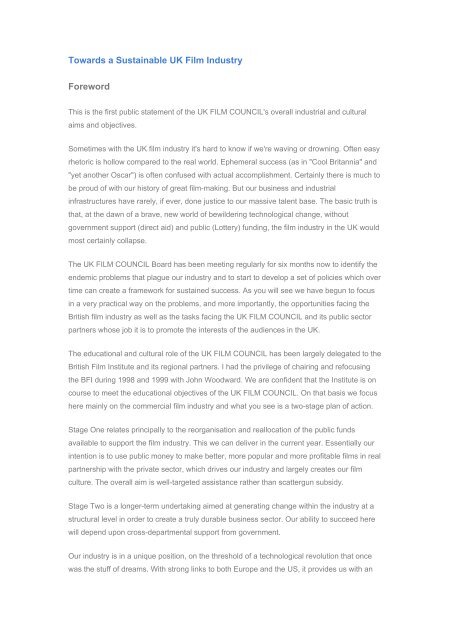Towards a Sustainable UK Film Industry Foreword - BFI - British Film ...
Towards a Sustainable UK Film Industry Foreword - BFI - British Film ...
Towards a Sustainable UK Film Industry Foreword - BFI - British Film ...
Create successful ePaper yourself
Turn your PDF publications into a flip-book with our unique Google optimized e-Paper software.
<strong>Towards</strong> a <strong>Sustainable</strong> <strong>UK</strong> <strong>Film</strong> <strong>Industry</strong><br />
<strong>Foreword</strong><br />
This is the first public statement of the <strong>UK</strong> FILM COUNCIL's overall industrial and cultural<br />
aims and objectives.<br />
Sometimes with the <strong>UK</strong> film industry it's hard to know if we're waving or drowning. Often easy<br />
rhetoric is hollow compared to the real world. Ephemeral success (as in "Cool Britannia" and<br />
"yet another Oscar") is often confused with actual accomplishment. Certainly there is much to<br />
be proud of with our history of great film-making. But our business and industrial<br />
infrastructures have rarely, if ever, done justice to our massive talent base. The basic truth is<br />
that, at the dawn of a brave, new world of bewildering technological change, without<br />
government support (direct aid) and public (Lottery) funding, the film industry in the <strong>UK</strong> would<br />
most certainly collapse.<br />
The <strong>UK</strong> FILM COUNCIL Board has been meeting regularly for six months now to identify the<br />
endemic problems that plague our industry and to start to develop a set of policies which over<br />
time can create a framework for sustained success. As you will see we have begun to focus<br />
in a very practical way on the problems, and more importantly, the opportunities facing the<br />
<strong>British</strong> film industry as well as the tasks facing the <strong>UK</strong> FILM COUNCIL and its public sector<br />
partners whose job it is to promote the interests of the audiences in the <strong>UK</strong>.<br />
The educational and cultural role of the <strong>UK</strong> FILM COUNCIL has been largely delegated to the<br />
<strong>British</strong> <strong>Film</strong> Institute and its regional partners. I had the privilege of chairing and refocusing<br />
the <strong>BFI</strong> during 1998 and 1999 with John Woodward. We are confident that the Institute is on<br />
course to meet the educational objectives of the <strong>UK</strong> FILM COUNCIL. On that basis we focus<br />
here mainly on the commercial film industry and what you see is a two-stage plan of action.<br />
Stage One relates principally to the reorganisation and reallocation of the public funds<br />
available to support the film industry. This we can deliver in the current year. Essentially our<br />
intention is to use public money to make better, more popular and more profitable films in real<br />
partnership with the private sector, which drives our industry and largely creates our film<br />
culture. The overall aim is well-targeted assistance rather than scattergun subsidy.<br />
Stage Two is a longer-term undertaking aimed at generating change within the industry at a<br />
structural level in order to create a truly durable business sector. Our ability to succeed here<br />
will depend upon cross-departmental support from government.<br />
Our industry is in a unique position, on the threshold of a technological revolution that once<br />
was the stuff of dreams. With strong links to both Europe and the US, it provides us with an
extraordinary opportunity for substantial growth and lasting success. We cannot claim to have<br />
all the answers in the pages that follow, it is just the beginning. But it's time for all of us in the<br />
film industry, and those that comment on it, to honestly face up to the realities and then<br />
perhaps we have a chance of realising our dreams.<br />
Alan Parker CBE
Executive Summary<br />
The <strong>UK</strong> FILM COUNCIL is proposing a series of major new initiatives as a first stage towards<br />
creating a sustainable and entrepreneurial <strong>British</strong> film industry. This will involve the rapid<br />
restructuring of public support for film to encourage the development, production and export<br />
of a more consistent flow of films that attract audiences in the <strong>UK</strong> and all over the world.<br />
Among the first stage initiatives proposed by the <strong>UK</strong> FILM COUNCIL are:<br />
• A major new Development Fund with a budget of £5 million a year to support the<br />
development of a stream of high quality, innovative and commercially attractive<br />
screenplays<br />
• The Premiere Fund with a budget of £10 million a year to facilitate the production of<br />
popular mainstream <strong>British</strong> films<br />
• The New Cinema Fund with a budget of £5 million a year to back radical and<br />
innovative filmmakers, most especially new talent, and to explore new electronic<br />
production technologies<br />
• The Training Fund with a budget of £1 million a year to support a massive expansion<br />
in training for scriptwriters and development executives, and a tightly targeted<br />
programme to train business executives, producers and distributors operating in the<br />
international markets<br />
• Development of a comprehensive European strategy to expand business and<br />
creative relationships with European partners which includes earmarking 20% of each<br />
film fund for European backed films (approximately £4.2 million a year)<br />
• A programme to stimulate the export of <strong>British</strong> films around the globe and to exploit<br />
new opportunities opening up via Internet distribution<br />
• A significant expansion of the <strong>British</strong> <strong>Film</strong> Office in Los Angeles as a conduit for<br />
attracting inward investment, promoting film exports and co-ordinating <strong>UK</strong> FILM<br />
COUNCIL training initiatives<br />
• "First Movies" - a Lottery programme running in 2001 with a budget of £1 million to<br />
resource 100s of low budget short films offering children the opportunity to learn<br />
about film-making and displaying their talents<br />
• The creation of a Market Intelligence Unit to provide authoritative statistics about the<br />
<strong>British</strong> film industry for the benefit of the industry itself, government and the media<br />
• A package of specific measures to ensure that over time the <strong>British</strong> film industry<br />
reflects the rich cultural diversity of the <strong>UK</strong>, and offers equality of opportunity and<br />
access to individuals whatever their background<br />
• A major review process aimed at creating a truly effective working partnership<br />
between the publicly-funded national and regional film bodies in the <strong>UK</strong>
A second series of initiatives, to be announced in early 2001, will include proposals to:<br />
• Establish more favourable conditions to encourage the creation of integrated <strong>British</strong><br />
film companies<br />
• Increase access to venture capital and private equity, to address key structural<br />
problems facing the industry<br />
• Exploit the full potential of new technologies<br />
Expenditure Summary £m US $m* Euro m**<br />
Existing Initiatives<br />
Education (<strong>BFI</strong> grant) 16.00 25.60 26.40<br />
Inward Investment 1.00 1.60 1.65<br />
<strong>Film</strong> Production Franchises 15.00 24.00 24.75<br />
Sub-total 32.00 51.20 52.80<br />
New Initiatives<br />
Development Fund 5.00 8.00 8.25<br />
Premiere Fund 10.00 16.00 16.50<br />
New Cinema Fund 5.00 8.00 8.25<br />
Training Fund 1.00 1.60 1.65<br />
"First Movies" 1.00 1.60 1.65<br />
Export Promotion 0.20 0.32 0.33<br />
Sub-total 22.20 35.52 36.63<br />
TOTAL 54.20 86.72 89.43<br />
* Converted at $1.6/£1<br />
** Converted at Euro 1.65/£1
Introducing the <strong>UK</strong> <strong>Film</strong> Council<br />
The Government has recognised film as a key part of the <strong>UK</strong> creative industries which have a<br />
collective turnover of close to £60 billion a year.<br />
The <strong>UK</strong> FILM COUNCIL has been established by the Government as the strategic agency<br />
responsible for developing the film industry and film culture in the <strong>UK</strong>. To achieve its<br />
objectives the <strong>UK</strong> FILM COUNCIL will build on the work undertaken by the <strong>Film</strong> Policy<br />
Review Group and the subsequent <strong>Film</strong> Policy Review Action Committee during 1997/8.<br />
The <strong>UK</strong> FILM COUNCIL will encourage the creative industries through educational<br />
opportunity, improved access to films, excellence and innovation - in line with the objectives<br />
laid out for it by its sponsoring government department, the Department for Culture, Media &<br />
Sport (DCMS). In addition, the <strong>UK</strong> FILM COUNCIL will also work closely with all relevant<br />
government departments and government funded agencies to deliver on its objectives.<br />
Since November 1999, the <strong>UK</strong> FILM COUNCIL Board has been pursuing policies to achieve<br />
two overarching objectives:<br />
• Developing a sustainable <strong>UK</strong> film industry<br />
• Developing film culture in the <strong>UK</strong> by improving access to, and education about the<br />
moving image<br />
The <strong>British</strong> <strong>Film</strong> Institute (<strong>BFI</strong>), which is now funded primarily by the <strong>UK</strong> FILM COUNCIL, was<br />
restructured and refocused during 1998/9 to deliver on the Council's cultural and educational<br />
objectives for film. The Institute is on track to play its part in achieving the <strong>UK</strong> FILM<br />
COUNCIL's goals and will act on the Council's behalf to foster public appreciation of film<br />
through improved access to cinema, film heritage and educational provision.<br />
Joined-up government<br />
The <strong>UK</strong> FILM COUNCIL will be consulting or working directly with the following government<br />
departments and government funded bodies:<br />
DEPARTMENT FOR CULTURE, MEDIA & SPORT (DCMS)<br />
The <strong>UK</strong> FILM COUNCIL's sponsoring body Co-production treaties<br />
THE TREASURY<br />
Fiscal policy for the film industry<br />
DEPARTMENT FOR TRADE & INDUSTRY (DTI)<br />
Inward investment and export promotion
DEPARTMENT FOR EDUCATION & EMPLOYMENT (DfEE)<br />
Education and training policy<br />
FOREIGN & COMMONWEALTH OFFICE (FCO)<br />
<strong>British</strong> <strong>Film</strong> Office in Los Angeles<br />
BRITISH COUNCIL<br />
SKILLSET<br />
Export promotion<br />
National Training Organisation<br />
ARTS COUNCIL OF ENGLAND<br />
Lottery funding for film capital projects 'Artists <strong>Film</strong> & Video' projects<br />
The Government has identified 13 goals for the <strong>UK</strong> FILM COUNCIL:<br />
1. Provide leadership and guidance for the industry<br />
2. Act as an interface between the industry, its representative bodies and DCMS<br />
3. Promote film activity in the nations and regions and ensure that national and regional<br />
bodies work in concert to contribute towards the <strong>UK</strong> FILM COUNCIL's goals<br />
4. Improve education about the moving image<br />
5. Extend and improve access to film culture and film heritage, serving the diverse<br />
geographical needs of the <strong>UK</strong>'s nations and regions, and recognising the differing<br />
needs of rural, suburban and metropolitan locations<br />
6. Support innovative film-making, to develop film culture and encourage creative<br />
excellence and nurture new talent<br />
7. Support and encourage cultural diversity and social inclusiveness<br />
8. Help maximise inward investment<br />
9. Help maximise exports<br />
10. Attract more private finance into film in order to catalyse the emergence of new<br />
structures<br />
11. Improve the quality of <strong>British</strong> films and ensure they receive appropriate exposure<br />
12. Promote and encourage use of digital technology<br />
13. Help ensure an adequate supply of skills and new talent<br />
The bulk of the report relates to the development of the <strong>British</strong> film industry and "<strong>Towards</strong> a<br />
<strong>Sustainable</strong> <strong>UK</strong> <strong>Film</strong> <strong>Industry</strong>" is a first statement of the <strong>UK</strong> FILM COUNCIL's key industrial<br />
aims. It sets out the initiatives to be developed and delivered in partnership with the industry<br />
and other public bodies over the coming years.
In this respect the <strong>UK</strong> FILM COUNCIL's task is to establish a robust market economy for <strong>UK</strong><br />
film AND to sustain film-making excellence.<br />
Clearly, the <strong>UK</strong> FILM COUNCIL cannot achieve even its industrial aims by working in<br />
isolation. Our policies will therefore be geared to working with third parties across the <strong>UK</strong> with<br />
an emphasis on the private sector wherever possible. Only in this way can the <strong>UK</strong> FILM<br />
COUNCIL use its limited funding as a real catalyst for change.<br />
£ 1.42 billion - Combined value of <strong>UK</strong> box office in 1999 together with the market for<br />
films on video (rental and retail)<br />
£55 million - Annual <strong>UK</strong> FILM COUNCIL budget<br />
The <strong>UK</strong> FILM COUNCIL's annual budget will vary according to the number of lottery tickets<br />
sold but is likely to be in excess of £55 million a year and is derived from two sources -<br />
Treasury grant and the National Lottery.<br />
The <strong>UK</strong> FILM COUNCIL went "live" in April 2000 when it took responsibility for:<br />
• The <strong>British</strong> <strong>Film</strong> Commission (promoting inward investment)<br />
• The Arts Council of England's Lottery <strong>Film</strong> Department (investing in film production)<br />
• The <strong>British</strong> <strong>Film</strong> Institute's Production Department (investing in film production)<br />
• <strong>British</strong> Screen Finance, a publicly supported film investment company, which will<br />
become incorporated into the <strong>UK</strong> FILM COUNCIL later this year<br />
• The <strong>British</strong> <strong>Film</strong> Institute (<strong>BFI</strong>) which is an independent body funded by the <strong>UK</strong> FILM<br />
COUNCIL to deliver cultural and educational opportunities for the public.
The Current Environment<br />
Over the last few months the <strong>UK</strong> FILM COUNCIL has analysed the global environment within<br />
which the <strong>British</strong> film industry operates. In addition, the Council has consulted the industry<br />
about the strategic use of lottery money. As a result a number of strengths and weaknesses<br />
have been identified.<br />
Among the key strengths which provide a solid foundation for future growth are:<br />
• A flourishing creative community embracing writers, directors, producers and acting<br />
talent<br />
• Strong links with creative and financial partners from Europe, North America and the<br />
rest of the world<br />
• A competitive advantage conferred by the English language<br />
• A tradition of innovation and creativity, notably in respect of new talent<br />
• A highly developed infrastructure for financing, licensing and selling films<br />
internationally<br />
• Highly skilled and flexible technicians and craftspeople who attract inward investment<br />
from across the world, most especially the US<br />
• An internationally competitive post-production industry operating at the cutting-edge<br />
of new technology<br />
• A growing number of cinema screens<br />
• A growing domestic audience for films<br />
• An established audience for <strong>British</strong> films in certain key foreign territories<br />
Annual <strong>UK</strong> box office admissions have risen from a post-war low of 54 million in 1984<br />
to 139.5 million in 1999<br />
The number of cinema screens in the <strong>UK</strong> has risen from 1,271 in 1984 to 2,758 in 1999<br />
Total investment in <strong>UK</strong> cinemas since 1985: approximately £2 billion<br />
Identified weaknesses of the industry which inhibit growth include:<br />
• An insufficient number of integrated <strong>UK</strong> companies operating across development,<br />
production and distribution<br />
• A failure to attract significant finance from the financial markets or key potential trade<br />
investors<br />
• A <strong>UK</strong> distribution sector which does not prioritise <strong>British</strong> films<br />
• Hundreds of under-capitalised production companies<br />
• An under-developed entrepreneurial and business skillsbase
• Under-resourced script development resulting in too many poor quality films being<br />
made<br />
• A failure to capitalise upon the full range of opportunities offered by digital<br />
technologies<br />
• A lack of investment in new talent<br />
• A patchwork of film initiatives in the English regions which collectively do not<br />
contribute sufficiently to the commercial film industry<br />
• A continuing exodus of established talent to Hollywood<br />
• A well developed appetite amongst audiences and exhibitors for US film<br />
• A failure to draw upon and reflect the full social and cultural diversity of the <strong>UK</strong><br />
In 1999, US distributors took an 85% share of the <strong>UK</strong> theatrical market.<br />
<strong>British</strong> films averaged a 15% share of the <strong>UK</strong> box office between 1994-1999
A Two Stage Action Plan<br />
On the basis of this analysis the <strong>UK</strong> FILM COUNCIL has drawn up a two stage action plan.<br />
Stage One: (May-September 2000)<br />
The <strong>UK</strong> FILM COUNCIL will set up a new programme for the use of public funds in order to:<br />
• Improve the quality of scripts<br />
• Stimulate commercial film-making in partnership with the private sector<br />
• Encourage creative innovation<br />
• Improve the quality and appeal of <strong>British</strong> films<br />
• Improve the skills of the <strong>UK</strong>'s film talent base<br />
• Encourage the use of new production technologies<br />
• Bring structural coherence to public support for film<br />
• Reduce the existing overhead for production support in order to fund new initiatives<br />
In addition, the <strong>UK</strong> FILM COUNCIL will further develop other initiatives already underway,<br />
notably:<br />
• The expansion of the <strong>British</strong> <strong>Film</strong> Commission<br />
• Encouraging the <strong>BFI</strong>'s new strategies for film education, cinema exhibition and<br />
access to film heritage and history<br />
• Developing closer links with the European and US film industries<br />
• The creation of specific training programmes for writers and business affairs<br />
executives<br />
• Developing a package of proposals to promote film exports<br />
• Completing the mid-term review of the existing three Lottery film franchises<br />
• Finalising proposals for a market intelligence unit inside the <strong>UK</strong> FILM COUNCIL<br />
• Promoting a common purpose between the various publicly-funded film bodies in the<br />
<strong>UK</strong>'s nations and regions<br />
• Developing a strategy to ensure equality of opportunity and to promote social<br />
inclusion and cultural diversity<br />
Stage Two: (finalised by December 2000)<br />
The <strong>UK</strong> FILM COUNCIL will develop a detailed package of policy proposals designed to<br />
encourage real structural change for the benefit of the <strong>British</strong> film industry. Analysis and<br />
discussion is already underway but given the depth of the problem, implementation of these<br />
proposals will take place over a number of years.
For example, after discussion with the commercial industry the <strong>UK</strong> FILM COUNCIL has<br />
concluded that the well-publicised problems facing <strong>British</strong> feature films seeking theatrical<br />
distribution will not be solved by subsidising print and marketing costs with public funds.<br />
Instead, the <strong>UK</strong> FILM COUNCIL believes that more effective distribution of <strong>UK</strong> films will be<br />
achieved partly through the development of consistently better scripts (aided by a Stage One<br />
initiative) and partly as a result of new film policies which will include:<br />
• A strategy to establish better conditions to encourage the creation of integrated<br />
<strong>British</strong> film companies<br />
• Proposals developed, in conjunction with the <strong>Film</strong> Finance Forum, to increase access<br />
to venture capital and private equity for the <strong>UK</strong> industry<br />
• Recommendations for fiscal measures aimed at achieving the above<br />
• Any policy proposals necessary to correct market failure in the <strong>UK</strong> industry<br />
• An analysis of the needs of the exhibition sector drawn up in consultation with the<br />
private sector, the <strong>BFI</strong> and the Arts Council of England leading to an action plan to<br />
further broaden the range of films available to <strong>UK</strong> audiences<br />
• A review of opportunities for using digital technology to enhance the <strong>UK</strong>'s competitive<br />
position<br />
• A strategy to encourage the industry to work even more effectively with partners in<br />
Europe, North America and the rest of the world<br />
• Clear advocacy positions on key cross-sectoral and international policy issues<br />
• A comprehensive film industry training strategy in conjunction with Skillset
Timetable for Action<br />
July 1998 Government announces proposal to create a single agency for film<br />
May 1999 Secretary of State for Culture, Media and Sport announces the <strong>UK</strong> FILM<br />
COUNCIL to be up and running by April 2000<br />
August 1999 Chairman of the <strong>UK</strong> FILM COUNCIL, Alan Parker CBE, is appointed<br />
September 1999 Chief Executive Officer of the <strong>UK</strong> FILM COUNCIL, John Woodward is<br />
appointed<br />
October 1999 Directors of the <strong>UK</strong> FILM COUNCIL appointed<br />
November 1999 First <strong>UK</strong> FILM COUNCIL Board meeting<br />
February 2000 Memorandum signed with <strong>British</strong> Screen Finance leading to eventual<br />
incorporation into the <strong>UK</strong> FILM COUNCIL<br />
1 April 2000 <strong>Film</strong> Council goes 'live'<br />
2 May 2000 Six month financing arrangements announced for Lottery backed single<br />
films, the former <strong>BFI</strong> Production Department, <strong>British</strong> Screen Finance and<br />
the European Co-Production Fund<br />
June 2000 <strong>Film</strong> Council announces Stage One strategy<br />
Summer 2000 <strong>Film</strong> Council staff move into new premises<br />
<strong>Film</strong> Council implements Stage One strategy, reorganises staff and<br />
appoints key creatives<br />
1 October 2000 <strong>British</strong> Screen Finance becomes incorporated into the <strong>UK</strong> FILM<br />
COUNCIL New film funds go 'live'<br />
January 2001 <strong>UK</strong> FILM COUNCIL announces Stage Two policy proposals
New Initiatives<br />
The Development Fund<br />
The <strong>UK</strong> FILM COUNCIL has identified the lack of support for script development as the single<br />
biggest problem affecting the ability of the <strong>UK</strong> industry to deliver a consistent flow of high<br />
quality films. All sectors of the industry agree that the lack of support for script development<br />
results in finished films which are too often sub-standard and subsequently wholly or partially<br />
rejected by the distribution sector.<br />
The <strong>UK</strong> FILM COUNCIL will therefore allocate £5 million a year for three years to develop<br />
scripts. This new fund will be overseen by an industry professional who will assess and<br />
approve individual projects and slates of projects through joint venture arrangements with the<br />
private sector. This development fund will be one of the largest public funds of its type in<br />
Europe.<br />
The Development Fund aims to:<br />
• Operate in partnership with the private sector<br />
• Improve the quality of <strong>British</strong> scripts on offer to the entire <strong>UK</strong> industry ensuring a<br />
consistent flow of high quality <strong>British</strong> films<br />
• Improve the commercial performance of <strong>British</strong> films around the world<br />
• Help develop the <strong>UK</strong> film industry's infrastructure<br />
• Generate projects which have the potential to secure effective worldwide distribution<br />
• Attract new talent to the industry<br />
• Develop the talent and skills base of the <strong>UK</strong> industry ensuring a more competitive<br />
workforce<br />
• Ensure equality of opportunity and promote social inclusion and cultural diversity. In<br />
keeping with the <strong>UK</strong> FILM COUNCIL's approach to developing <strong>UK</strong> talent this fund will<br />
be closely linked to the <strong>UK</strong> FILM COUNCIL's training fund for writers and<br />
development executives.<br />
Applications and pitches will be welcomed from producers, writers and directors, as well as<br />
established film companies.<br />
The precise investment criteria for the fund will be developed over the coming months but<br />
among the governing principles are the following:<br />
• The fund will be used to pay for rights acquisitions and script writing and development<br />
fees
• Repayment on development or rights acquisition loans will be on standard<br />
commercial terms. The average budget for <strong>UK</strong>-producer films in 1999 was £4.3<br />
million.<br />
The Premiere Fund<br />
The <strong>UK</strong> FILM COUNCIL recognises the continuing need to offer funding to the production<br />
sector for viable high quality <strong>UK</strong> films at an early stage in the financing process. Committing<br />
production finance at this point will enable the production sector to leverage better terms from<br />
the private sector to complete the financing package.<br />
Consultation with industry has confirmed that decision-making for investment of public funds<br />
into feature films should be delegated to qualified professionals rather than to a 'committee'.<br />
'Automatic' systems for investment fall outside the scope of Lottery funding.<br />
The <strong>UK</strong> FILM COUNCIL will therefore allocate approximately £10 million a year for 3 years to<br />
invest in feature film production. This fund will be managed by a Head of Production recruited<br />
from the commercial film industry. There will be an investment ceiling of £1 million per film.<br />
The Head of Production will have the ability to offer public funds first rather than last and also<br />
to invest during 'pre-production' where appropriate. The fund will aim to invest in 10-12 films<br />
each year. <strong>Film</strong> budgets will range from a minimum of £1 million up to £8 million plus. The<br />
<strong>UK</strong> FILM COUNCIL is also examining ways to leverage this fund to support the production of<br />
higher budget films.<br />
The Premiere Fund aims to:<br />
• Help <strong>British</strong> film companies leverage better deals in order to grow their businesses<br />
• Facilitate the production of popular <strong>British</strong> theatrical films which are profitable and<br />
attract significant audiences at home and abroad<br />
• Encourage inward investment of production finance into the <strong>UK</strong><br />
• Develop the skills base of the <strong>British</strong> industry and attract both new and established<br />
talent<br />
• Broaden the range of films on offer to the <strong>British</strong> public<br />
The precise investment criteria for the fund will be finalised over the coming months but<br />
among the governing principles are the following:<br />
• The fund will offer an 'open door' for the best feature film projects<br />
• <strong>UK</strong> FILM COUNCIL investment will not be forthcoming unless a commercially viable<br />
distribution strategy is guaranteed as an integral part of the financing package<br />
• The Premiere Fund may solicit projects from key talent according to an approved<br />
'solicitation strategy'
• Recoupment targets will be pegged to commercial norms<br />
The New Cinema Fund<br />
Creativity and innovation have always been a hallmark of <strong>British</strong> cinema. Many <strong>British</strong> film-<br />
makers have built international reputations through the development of a distinctive cinematic<br />
style and personal vision.<br />
The New Cinema Fund will be allocated an annual budget of £5 million for three years in<br />
order to support and nurture new talent and to encourage cutting-edge and innovative film-<br />
making of low budget feature films and short films.<br />
A strong emphasis will be placed on the use of new technology.<br />
In addition, a proportion of the New Cinema Fund will be dedicated to regional activities and<br />
identifying and nurturing emerging film talent.<br />
Led by a Head of Production a small team of executives will manage different elements of the<br />
fund (features, shorts, regional partnerships etc). This fund will operate in a highly<br />
collaborative way with partners drawn from across the private and public sectors in the <strong>UK</strong><br />
and abroad.<br />
The New Cinema Fund aims to:<br />
• Discover and develop new film talent<br />
• Encourage innovation in form and content<br />
• Attract established film talent working outside the mainstream<br />
• Encourage the use of new technology in production and distribution<br />
• Develop talent and infrastructure in the regions and nations<br />
• Ensure equality of opportunity and promote social inclusion and cultural diversity<br />
• Challenge audiences<br />
• Broaden the range of films on offer in the <strong>UK</strong><br />
• Guarantee the effective distribution and exhibition of films backed by the fund<br />
'First Movies'<br />
Applications and pitches will be welcomed from individuals and organisations with<br />
talent. Target recoupment rates for the fund will be softer than commercial norms, but<br />
budgets will be commensurately lower.<br />
A grant-funded programme supported by £1 million of Lottery funds will offer children and<br />
young people the opportunity to try film-making and display their talents. <strong>Film</strong>s will be shot<br />
using latest low-cost technology. The scheme will operate on a regional basis and a
showcase will be developed for the best films. This large-scale initiative will be launched in<br />
2001.<br />
The Training Fund<br />
Training is key to the sustained success of the <strong>UK</strong> film industry. The creative and technical<br />
talent at work in the <strong>British</strong> film industry is world class. However, the maintenance of that skills<br />
base during a period of accelerated technological change is essential to retaining the <strong>UK</strong>'s<br />
competitive position, both as an indigenous industry, and as a magnet for inward investment.<br />
The DCMS <strong>Film</strong> Policy Review Group (1997/8) identified a number of priority areas for action<br />
in the field of training. As a result Skillset (the National Training Organisation for broadcast,<br />
film, video and interactive media) now supports training for craftspeople and production<br />
accountants as well as health and safety training and the delivery of NVQ qualification<br />
measures, with money generated by the industry backed Skills Investment Fund (SIF).<br />
However, the <strong>UK</strong> FILM COUNCIL must now address two key priorities not tackled by the SIF:<br />
• Training for scriptwriters, script editors and development executives<br />
• Training for producers/business executives/distributors The <strong>UK</strong> FILM COUNCIL has<br />
therefore allocated £1 million each year for three years to support training initially in<br />
these two areas.<br />
In addition, the <strong>UK</strong> FILM COUNCIL will identify a more comprehensive policy for film industry<br />
training by the end of the year. This policy will include schemes aimed at stimulating<br />
increased collaboration with both Europe and the US.<br />
In the <strong>UK</strong> the <strong>UK</strong> FILM COUNCIL will work with Skillset and the industry to identify additional<br />
training needs and gaps in the skills base. Where gaps are identified a strategy will be drawn<br />
up to address them. Future strategy will take particular account of the development of digital<br />
technologies.<br />
It is anticipated that the delivery of <strong>UK</strong> training initiatives will be co-ordinated through Skillset<br />
which will also be responsible for identifying and evaluating quality training provision in<br />
conjunction with the <strong>UK</strong> FILM COUNCIL.<br />
Separately, the <strong>UK</strong> FILM COUNCIL is also building a strategic alliance with the National<br />
Endowment for Science, Technology and the Arts (NESTA), in order to nurture individual<br />
creativity in film.<br />
The Government funded National <strong>Film</strong> & Television School does not fall under the auspices of<br />
the <strong>UK</strong> FILM COUNCIL but it is anticipated that a strong working relationship will be<br />
developed.
Training for scriptwriters/development executives<br />
The <strong>UK</strong> FILM COUNCIL has already undertaken a <strong>UK</strong> audit of training for scriptwriters, script<br />
editors and development executives.<br />
Key problems identified:<br />
• Training and development within the <strong>UK</strong> is patchy, uncoordinated and lacks any<br />
strategic basis<br />
• There is a general confusion between training individuals and developing projects for<br />
production<br />
• The majority of individuals involved in developing screenplays lack both the<br />
experience and the skills to work to the best of their ability<br />
• The current lack of script development funding in the <strong>UK</strong> is undermining the quality of<br />
screenplays going into production, but development money, by itself, will not solve<br />
the problem<br />
• All current training provision is too short-term and lacks 'follow through'<br />
• A lack of understanding regarding the tastes of audiences in the US and continental<br />
Europe.<br />
The <strong>UK</strong> FILM COUNCIL is therefore working on a strategy in conjunction with Skillset which<br />
will provide support for a range of initiatives to include the following:<br />
• Introductory courses across the <strong>UK</strong> for aspiring screenwriters<br />
• Intensive training based around development of specific projects<br />
• A programme of project-based workshops and lectures for development executives<br />
• A course to provide structured training for script readers<br />
• A service providing readers for screenplays<br />
• A service to provide professional screenplay advice for independent, low-budget<br />
feature projects<br />
• A series of regular workshops for screenwriters, and development personnel, working<br />
on projects in active development<br />
• A rehearsed reading service providing the opportunity for draft scripts to be<br />
dramatised in front of an audience The <strong>UK</strong> FILM COUNCIL aims to work closely with<br />
existing training providers in the <strong>UK</strong> but only where the services on offer match the<br />
<strong>UK</strong> FILM COUNCIL's priorities.<br />
Training for business executives, producers, distributors<br />
There is an acknowledged absence of skilled business executives in the <strong>UK</strong> film industry.<br />
There is also a need to ensure effective training for those entering the distribution sector.
The <strong>UK</strong> FILM COUNCIL working through Skillset and other parties will deliver a business<br />
training programme to support the accelerated training and development of 12 emergent <strong>UK</strong><br />
film executives each year. The programme will be based primarily in London and Los<br />
Angeles.<br />
The aim is to develop general and specific film business skills and allow participants to build a<br />
powerful and extensive range of industry contacts. It will also encourage a global view of the<br />
film business. The programme will be targeted at individuals with a demonstrable track record<br />
in the production and distribution sectors.<br />
Market Intelligence Unit<br />
The <strong>Film</strong> Policy Review Group concluded accurately that the development of both public<br />
policy and the industry is being hampered by the shortage of up-to-date and comprehensive<br />
data on the film sector.<br />
To address this problem the <strong>UK</strong> FILM COUNCIL intends to create its own department to<br />
collect, analyse and disseminate film industry data on a comprehensive basis. This will also<br />
enable the <strong>UK</strong> FILM COUNCIL to measure the impact of its own public policy initiatives as<br />
well as providing a valuable service to the private sector.<br />
The Market Intelligence Unit will:<br />
• Conduct annual surveys providing statistical information on development, production,<br />
post-production, international sales, <strong>UK</strong> and foreign theatrical distribution, exhibition<br />
and ancillary markets<br />
• Respect commercial confidentiality<br />
• Provide Government with informed market intelligence on the performance of the<br />
<strong>British</strong> industry<br />
• Publish an annual survey of the <strong>UK</strong> film industry<br />
Export Promotion<br />
As the global market for film continues to grow, there is a real opportunity for the <strong>British</strong> film<br />
industry to boost its share of export markets across the world.<br />
In addition to a proven ability to create high-quality, accessible and engaging films, the <strong>UK</strong><br />
industry is also able to extract all the benefits of working in the English language.<br />
<strong>Film</strong> exports generate significant economic and cultural benefits while also showcasing <strong>British</strong><br />
talent, ideas and locations to audiences around the world.
The <strong>UK</strong> FILM COUNCIL is now developing a strategic alliance with the <strong>British</strong> Council's <strong>Film</strong><br />
and Television Department - active in 90 countries around the world - to create a joint strategy<br />
to promote <strong>British</strong> film abroad.<br />
In its first year of operation the <strong>UK</strong> FILM COUNCIL has created a £200,000 fund to partner<br />
with £500,000 from the <strong>British</strong> Council. Over time it is expected that the <strong>UK</strong> FILM COUNCIL's<br />
cash contribution will increase and that the <strong>British</strong> Council will focus on cultural promotion of<br />
<strong>British</strong> films whilst the <strong>UK</strong> FILM COUNCIL will focus on the promotion of the industry.<br />
Specific measures will include:<br />
• Support mechanisms for <strong>UK</strong> sales agents at overseas markets<br />
• Outward missions for <strong>UK</strong> sales agents to explore and map emerging markets<br />
• Showcases in targeted territories aimed at international buyers<br />
• Initiatives to attract overseas buyers to attend <strong>UK</strong> events<br />
• Gathering market intelligence about the export potential for <strong>British</strong> films<br />
• Using the worldwide web to promote and showcase <strong>British</strong> films to overseas buyers<br />
and audiences and to inform overseas film-makers about opportunities to work with<br />
<strong>British</strong> partners<br />
• Training in export marketing and distribution skills for <strong>UK</strong> film executives<br />
Nations and Regions<br />
In April 2000 the <strong>UK</strong> FILM COUNCIL commenced a regional review of the plethora of small<br />
publicly supported regional film bodies in England. The review will be completed by<br />
September 2000 and will form the basis of a development strategy for film in England.<br />
Public funded regional film activities:<br />
• Screen commissions<br />
• Production funds<br />
• Training activities<br />
• <strong>Film</strong> archives<br />
• Regional cinemas (RTFs) and film societies<br />
• Formal and informal educational programmes<br />
Pre-review <strong>UK</strong> FILM COUNCIL regional investment:<br />
• £1 million 2000/1 <strong>UK</strong> FILM COUNCIL production investment<br />
• £2 million 2000/1 <strong>UK</strong> FILM COUNCIL indirect investment in regional activities via <strong>BFI</strong><br />
(regional archives and film collections, education programmes and subsidy to<br />
cinemas)
• £3 million Total regional investment<br />
Significant gearing is achieved on this investment from other public sector agencies, the EU<br />
and the private sector. The level of gearing varies across England and is highest in poorer<br />
regions which have privileged access to EU Structural Development Funds.<br />
The <strong>UK</strong> FILM COUNCIL wants this review to provide the basis for an integrated and dynamic<br />
partnership which recognises the need for discrete but coherent regional policies as<br />
fundamental to achieving its overall aims. Maximum benefit will derive to regional<br />
organisations and practitioners who share the aims of the <strong>UK</strong> FILM COUNCIL.<br />
It is envisaged that the <strong>UK</strong> FILM COUNCIL's England-wide strategy will:<br />
• Eliminate duplication<br />
• Minimise administrative costs and maximise direct support for film-makers and<br />
audiences<br />
• Identify and nurture talent capable of career progression<br />
• Take account of differing regional characteristics and needs<br />
• Celebrate cultural diversity and promote equal access<br />
• Be as radical as necessary<br />
With the assistance of the DCMS, the review is being undertaken in partnership with the <strong>BFI</strong>,<br />
Skillset, the English Regional Arts Boards and the Arts Council of England. The process will<br />
involve a series of national and regionally-based consultation seminars.<br />
In addition the <strong>UK</strong> FILM COUNCIL is already developing a 'joined up' agenda with its sister<br />
organisations in Scotland, Wales and Northern Ireland (Scottish Screen, Sgrîn, and the<br />
Northern Ireland <strong>Film</strong> Commission), to ensure a common purpose across the <strong>UK</strong> from<br />
national funding bodies and to expand the opportunities for co-venturing on industrial and<br />
cultural initiatives.<br />
European Strategy<br />
The <strong>UK</strong> FILM COUNCIL recognises the importance of Europe both as a developing market<br />
and a cultural landscape through which the <strong>UK</strong> industry should be able to travel freely.<br />
The <strong>UK</strong> FILM COUNCIL wants the <strong>UK</strong> film industry to play a central role in the European<br />
industry rather than operating on the margins and has therefore set a number of objectives<br />
relating to Europe:
• Stimulating creative and economic collaboration between the <strong>British</strong> industry and<br />
other European film industries<br />
• Developing reciprocal relationships with key European film agencies<br />
• Providing European audiences with improved access to <strong>UK</strong> films<br />
• Providing <strong>UK</strong> audiences with improved access to European films<br />
• Influencing European film/audiovisual policy as developed by the European<br />
Commission, the Council of Europe and EU member states<br />
The <strong>UK</strong> FILM COUNCIL recognises both the increasing level of English-language film<br />
production emerging from continental Europe and the need for clear reciprocal relationships<br />
between European funding partners and the <strong>UK</strong> industry. On that basis public sector<br />
investment in non-English language films is not ruled out.<br />
Specific measures will include:<br />
• A target figure of 20% minimum of the annual budgets of the New Cinema, Premiere,<br />
Development and Training funds will be invested in projects involving European<br />
partners. This will result in a minimum of £4.2 million of investment by the <strong>UK</strong> FILM<br />
COUNCIL in European film each year and represents at least a 100% increase in<br />
existing public funding dedicated to European production<br />
• A senior <strong>UK</strong> FILM COUNCIL executive will be appointed to liaise and broker creative<br />
and business relationships with European partners<br />
• A low cost business affairs and legal service will be offered by the <strong>UK</strong> FILM<br />
COUNCIL's Business Affairs<br />
• Department for <strong>UK</strong> film companies involved in technically complex multi-party co-<br />
productions<br />
• The <strong>UK</strong> FILM COUNCIL's export promotion fund will ensure the exhibition and<br />
promotion of <strong>UK</strong> films in European territories for the benefit of both European<br />
audiences and potential investment partners<br />
• Proposals to systematically review the existing European co-production treaties will<br />
be brought forward<br />
• Proposals will be brought forward to review the definition of a <strong>UK</strong> qualifying film in the<br />
context of enhancing both European co-production as well as US production in the<br />
<strong>UK</strong><br />
• The <strong>UK</strong> FILM COUNCIL will clarify reciprocal arrangements for co-production with the<br />
key European film agencies<br />
Cultural diversity<br />
The <strong>UK</strong> FILM COUNCIL is committed to reflecting the richness and vitality of Britain's<br />
multicultural society and helping to create a culturally diverse film industry. This commitment
will be reflected in the employment policies of the Council and across the public policy<br />
initiatives developed by the Council. True cultural diversity can only be achieved if public<br />
support for film is accessible to all.<br />
The <strong>UK</strong> FILM COUNCIL will ensure that all its funds are open to everybody with sufficient<br />
talent and will directly target under-represented groups.<br />
The Council recognises that, in terms of participation, the <strong>British</strong> film industry has a long way<br />
to go and that genuine diversity will only be achieved over a period of years. The Council<br />
endorses the view of the <strong>Film</strong> Policy Review Group that the industry has paid too little<br />
attention to promoting opportunities for all and that in many disciplines members of the ethnic<br />
minorities, in particular, have been seriously under-represented on both sides of the camera<br />
even though they represent approximately 8% of the population of the <strong>UK</strong> and constitute 25%<br />
of the population in London. The Council has therefore prioritised the objective of inclusion of<br />
black and Asian film-making talent as part of mainstream <strong>British</strong> film culture.<br />
As part of Stage One it is envisaged that specific measures will include:<br />
• Earmarking funding for the training and development of black and Asian film talent<br />
• Appointing an individual, within the New Cinema Fund, with designated responsibility<br />
for ensuring that the fund provides specific opportunities for ethnic minorities and<br />
managing a database of black and Asian film-making talent based in the <strong>UK</strong><br />
• Collaborating with the <strong>British</strong> Council to examine the potential export markets for<br />
black and Asian films<br />
• Liaison with the <strong>British</strong> Screen Advisory Council which has been commissioned by<br />
DCMS to identify ways to increase participation of ethnic minority communities in the<br />
industry<br />
• Liaison with the <strong>BFI</strong> which has commissioned research in to ways of engaging more<br />
effectively with black and Asian audiences<br />
• Working with the newly created Cultural Diversity Network to improve representation<br />
from ethnic minority communities<br />
• Ensuring all <strong>UK</strong> FILM COUNCIL staff and Board members attend a mandatory course<br />
which will address diversity issues<br />
Further initiatives will be developed as the <strong>UK</strong> FILM COUNCIL's work extends into additional<br />
areas of the film industry.<br />
Social inclusion<br />
<strong>Film</strong> sits at the heart of <strong>British</strong> popular culture but for many people opportunities to appreciate<br />
and enjoy the medium or to contribute to the industry are limited. This may be as a result of<br />
poverty, disability, gender, ethnicity or other disadvantage.
The <strong>UK</strong> FILM COUNCIL aims to ensure that principles of equality of opportunity, social<br />
inclusion and cultural diversity underpin each of its Funds and other support measures as well<br />
as its own employment practices. To that end the <strong>UK</strong> FILM COUNCIL will prioritise the<br />
development of robust strategies that make this commitment a reality.<br />
In particular specific measures already identified include:<br />
• An audit, currently underway, on the provision for the disabled in terms of<br />
participation in film and the moving image. This will inform a strategy and specific<br />
proposals providing better integration of disabled people into the industry<br />
• Ensuring that feature films which receive public finance are made available in<br />
accessible formats (eg with subtitled prints for the hearing-impaired and audio<br />
description tracks)<br />
• The development of participatory production opportunities targeted at socially<br />
excluded groups in order to develop creative, technical and entrepreneurial skills
Developing Existing Delivery Mechanisms<br />
Education<br />
As the influence and impact of film and the moving image grows, so there is an increased<br />
need to understand the systems and constructs behind the stories which unfold on the<br />
screen. There is a particular need to pay attention to the requirements of younger audiences<br />
and generally to enhance access to the range of films available to the cinema-going public.<br />
The <strong>UK</strong> FILM COUNCIL intends to take its education objectives forward mainly in conjunction<br />
with the <strong>British</strong> <strong>Film</strong> Institute (<strong>BFI</strong>) which will receive a grant of £16 million in the first year of<br />
the <strong>UK</strong> FILM COUNCIL's operation.<br />
The <strong>UK</strong> FILM COUNCIL funds the <strong>BFI</strong> and its regional partners as the best mechanism for<br />
public money to deliver educational activities focused on film. This partnership between the<br />
<strong>UK</strong> FILM COUNCIL and the <strong>BFI</strong> will deliver:<br />
• Preservation of the <strong>UK</strong>'s film and moving image heritage for future generations<br />
• Improved access to the <strong>UK</strong>'s film and moving image collections<br />
• Access to more screens and to a broader range of films and moving image materials<br />
than the commercial sector will sustain by itself<br />
• Improved standards of formal teaching about film and the moving image<br />
• Teaching and educational materials increasingly utilising new technologies<br />
• Informal educational activities around films and the moving image<br />
• The implementation of key policy recommendations from the 1999 Making Movies<br />
Matter report on film education<br />
• Effective partnerships with other institutions with similar priorities in film education in<br />
the regions and nations<br />
The <strong>UK</strong> FILM COUNCIL also attaches particular importance to the <strong>BFI</strong>'s plans to develop a<br />
new National <strong>Film</strong> Centre on London's South Bank housing a new National <strong>Film</strong> Theatre,<br />
National Library and Museum.<br />
The recent reorganisation and restructuring of the <strong>BFI</strong> led to the creation of a three year<br />
corporate plan which will enable the <strong>UK</strong> FILM COUNCIL to judge the overall success of the<br />
Institute in delivering on its objectives by the end of the financial year 2003.<br />
The <strong>BFI</strong>'s regional partnerships with a range of public and private bodies delivering<br />
educational, archival and film-going opportunities will form part of the <strong>UK</strong> FILM COUNCIL's<br />
review of regional activities between April and September this year. The <strong>BFI</strong> also supports the<br />
"Regional <strong>Film</strong> Theatre" network of cinemas and will play an important role in the Council's<br />
Stage Two analysis of <strong>UK</strong> film exhibition to be undertaken later this year.
The <strong>BFI</strong> publishes an annual report towards the end of each calendar year.<br />
<strong>BFI</strong> Departments:<br />
Education £3.3 m<br />
Cinema Exhibition £7.0 m<br />
Collections £5.7 m<br />
<strong>UK</strong> FILM COUNCIL grant = £16.0 million for 2000/1<br />
<strong>Film</strong> Production Franchises<br />
In May 1997, following an open competition, the Arts Council of England announced the<br />
allocation of Lottery funds to three companies - The <strong>Film</strong> Consortium, Pathé Pictures and<br />
DNA <strong>Film</strong>s - over six years to part-finance a slate of films. The aim of these franchises is to<br />
foster an increase in the production of <strong>British</strong> films of high creative quality and with good<br />
commercial prospects. This is to be achieved by:<br />
• Strengthening the production sector by helping companies to finance a slate of films<br />
and sustain links with distributors<br />
• Providing plural sources of development and production funding for the sector<br />
• Placing more responsibility for the handling of projects in the hands of the franchise<br />
holders<br />
The franchises were awarded amounts up to £8 million in each of the first three years and up<br />
to £5 million in each of the remaining years of the franchise. The terms under which the<br />
Lottery funding would be made available were negotiated and are set out in the individual<br />
franchise agreements.<br />
Each agreement contains a provision for a review in the second half of the third year of the<br />
franchise. This review is now underway for two of the three franchises. The review will<br />
consider the performance of the franchisee in achieving the aim of the franchise by reference<br />
to agreed targets, and compliance with the terms of the agreement.
For further information contact:<br />
<strong>UK</strong> FILM COUNCIL<br />
10 Little Portland Street<br />
London W1W 7JG<br />
Tel + 44 (0) 20 7861 7861<br />
Fax +44 (0) 20 7861 7862<br />
www.ukfilmcouncil.org.uk

















